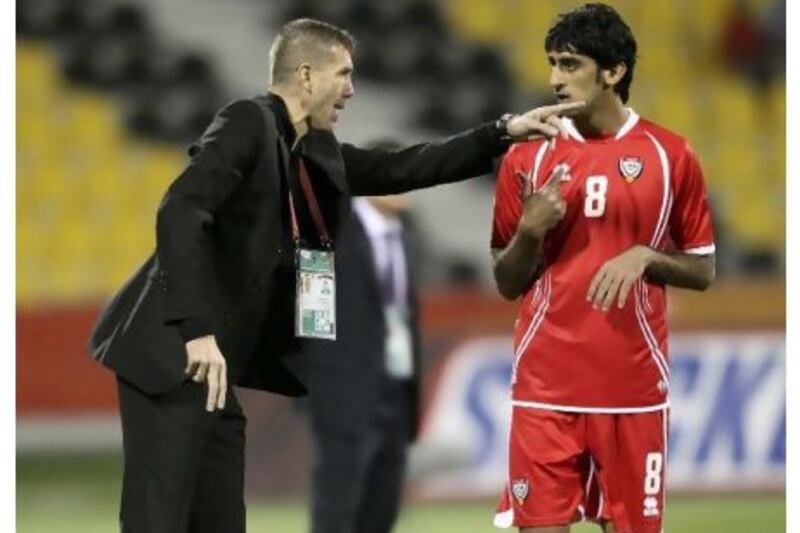Progress of Emiratis hindered by lack of those playing abroad. Getafe could open the door, writes Paul Oberjuerge
It was one comment from a lengthy press conference announcing the purchase of the Spanish top-flight side Getafe by a Dubai group, but Srecko Katanec did not miss it.
The new owners expressed an interest in having one or two Emirati players join the Madrid-based club.
Emiratis playing outside the country is the elephant in the room on the topic of "the UAE's place in world football". Almost alone among footballing nations who aspire to play in the World Cup, the UAE does not have even one player training and playing outside the country, and Katanec, the national team coach, is among many who believe that situation is stunting the game here.
"It would be good, 100 per cent, for the national team if we had some players in Getafe," he said. "It is difficult for the guys to grow up in this league and never leave it. It would be like if you and I played against each other every day. We would not learn much. We would not get better."
Katanec has an apples-to-apples example in his own life history.
He comes from Slovenia, a Balkan nation of only two million people: the national team there is drawn from a population not much larger than the 950,000 nationals who produce the UAE side.
Even the best Emiratis have spent the whole of their careers in the UAE. Top Slovenian players are scattered across Europe.
"In Serie A, in Germany, in France, everywhere," Katanec said yesterday. "On the Slovenian team, maybe only five or six play in the home league."
That international exposure, he said, is the biggest factor in Slovenia's emergence as one of the world's great "small" footballing nations. Slovenia are ranked No 17 in the world, nearly 100 slots ahead of the UAE, and have appeared in two of the last three World Cups.
Slovenia qualified for the 2010 event by defeating Russia in a home-and-away play-off and then came within an injury-time goal by the United States of advancing to the knock-out stages of the South Africa event.
The UAE have qualified for the World Cup finals only once, in 1990. Ahead of the 2010 World Cup, they failed to win a match in the final group stage of qualifying.
The Getafe purchase comes at a moment when several young Emiratis may be serious about going overseas. In recent weeks, the defenders Hamdan al Kamali and Abdullah Mousa and the midfielder Mohammed al Shehhi have expressed a desire to play in the world's elite leagues.
A Getafe club owned by UAE businessmen perhaps will offer them that chance. It is a first-division club, but not one at the top of the table, like Manchester City, who are owned by Sheikh Mansour bin Zayed. And Madrid has a climate not as radically different to that of the UAE as Manchester presents.
Training and playing in environments with tougher competition is critical to a player's development, Katanec said.
"They have to play hard every day to be a professional in Europe," he said. "The players there are hungry and there are more of them. Here, everything is easier to be a professional; it is not so difficult. You can be a good professional here with 50 per cent of the work that has to be done in Europe."
He also cited issues of salary; he said an Emirati who left the Pro League for Europe would be paid far less than he is here and suggested money has been a significant factor in the absence of UAE players overseas. "But if it is a true sportsman who wants to be the best, maybe someone will do it."
He said al Kamali, for example, is one of several Emiratis good enough to play in Europe now.
"I am 100 per cent sure that he could play immediately for some of the best clubs in Europe," Katanec said. "I see the stoppers in England and he is better than many of them. Our midfielders and forwards, it would be harder, but I can think of five or six players from my national team who could play in Europe."
Katanec understands cultural issues are in play, as well.
"Many players do not want to leave their families," he said. "And not just the close family, their whole family."
It may be too late for the 2014 World Cup cycle, which already has begun, but he believes the future of UAE football would be brighter if the best Emiratis played in England or France. Or in Spain at, say, Getafe.
"I'm sure the quality exists," he said. "We have players who are crazy-good technically. They can do everything with the ball. But they need to go outside the country to see how hard teams train, to learn to deal with the pressure.
"I will be happy if a couple of the players can join a stronger league in Spain or England.
"You would see that the national team would improve a lot if we had even two or three players at the higher levels."





